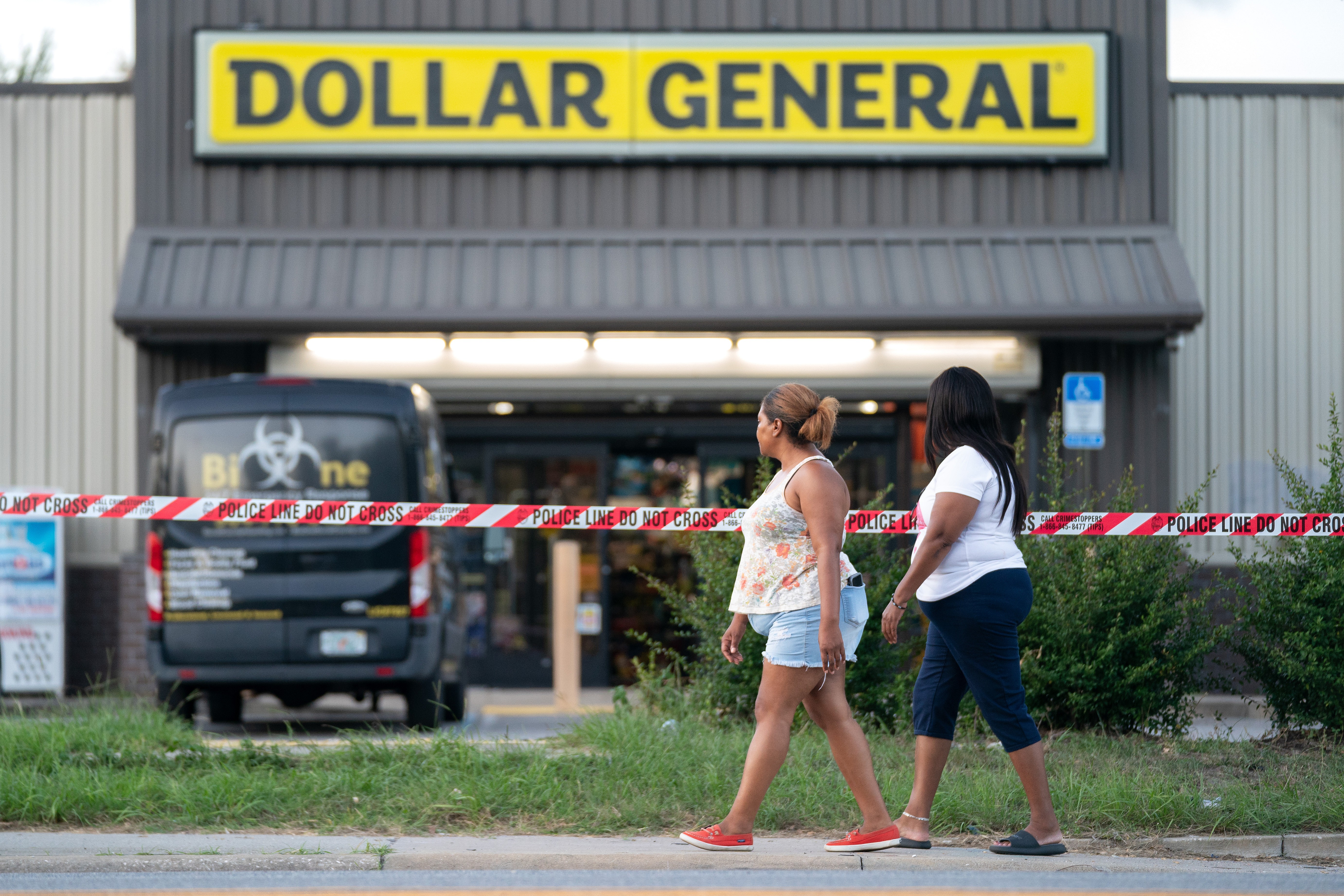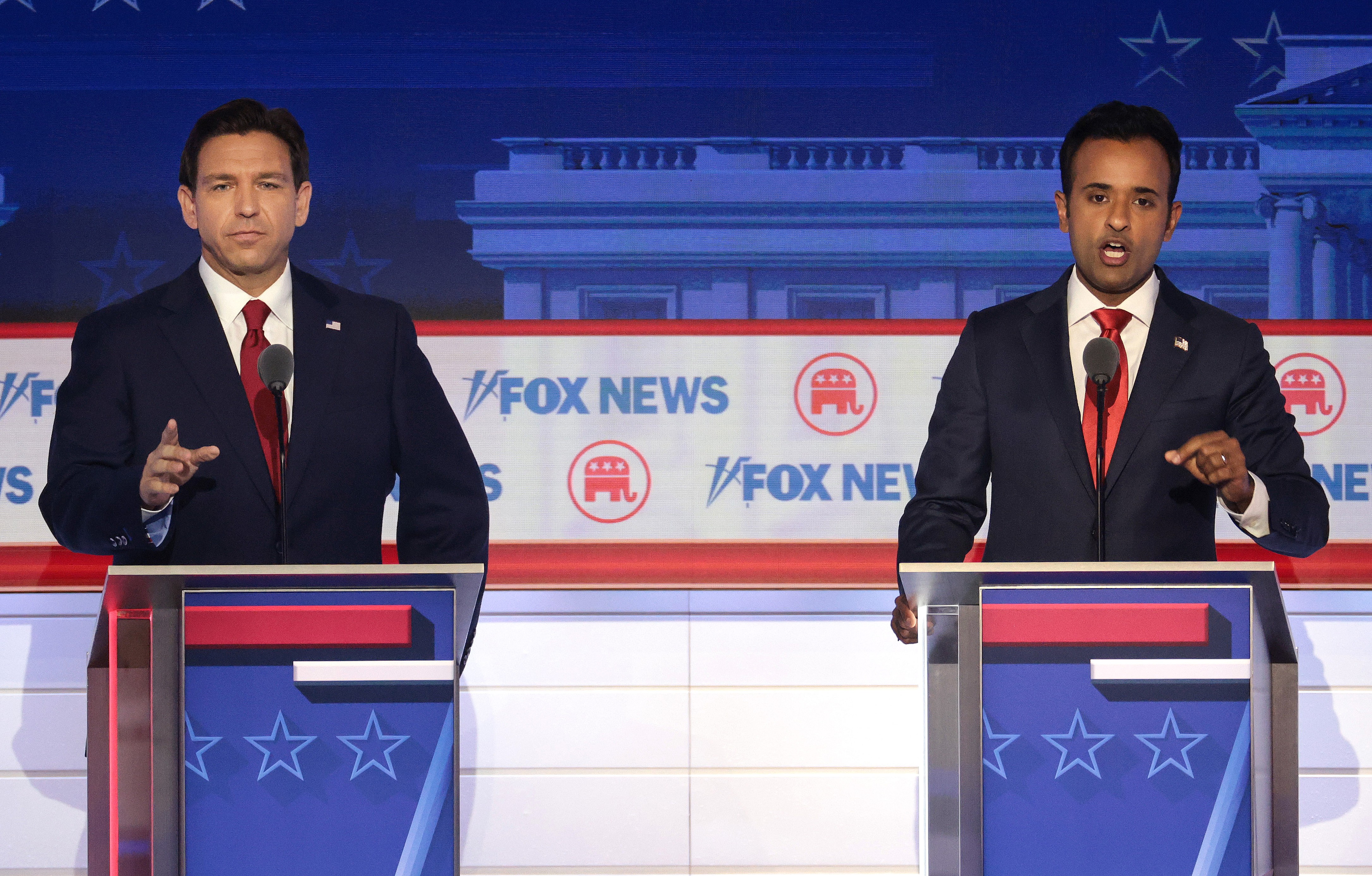One week after three Black people were murdered by a self-proclaimed white supremacist at a Dollar General in Jacksonville, Florida, fear of hate crime has risen in the United States, where the issue of race has reached fever-pitch and intensified political divisions.
Yet again, the nation is forced to confront the threat of racial violence in America.
“What we have yet to fully acknowledge and recognize is that white domestic terrorism has always been our biggest threat to this country and the safety of this country,” Christina M. Greer, associate professor of political science at Fordham University, told theGrio. “It’s always been sort of this poison in our soil, in our air, in our water that we’ve never, ever wanted to confront.”

In the aftermath of the Jacksonville shooting, community leaders and policy experts are urging more action from the Biden-Harris administration while also acknowledging the efforts it has already taken to combat hate and white domestic terrorism.
Days after the Aug. 26 racist attack, President Joe Biden and Vice President Kamala Harris, during a meeting with civil rights leaders, noted that it was one example of an ongoing threat of hate and discrimination.
“We can’t let hate prevail,” Biden said while seated at a roundtable that included Black advocates such as Rev. Al Sharpton, former U.N. Ambassador Andrew Young and children of Rev. Dr. Martin Luther King Jr, Bernice King and Martin Luther King III. “We’re not going to remain silent.”
What has the Biden-Harris administration done to address anti-Black hate crimes?
Melanie Campbell, an activist and organizer who attended the White House meeting last week, told theGrio that civil rights leaders requested the Biden-Harris administration to “build upon” the president’s United We Stand Summit on anti-hate held last year by taking it “on the road,” beginning in Jacksonville.
Campbell, CEO of the National Coalition on Black Civic Participation and convener of the Black Women’s Roundtable, said such a tour around the country is needed as “there is a national trend of increased hate crimes,” in addition to “attacks on our rights and freedoms,” like restrictions on teaching African-American history and bans on books by Black authors in some states.
LaShawn Warren, chief policy officer at Southern Poverty Law Center, told theGrio that the White House must also “follow on commitments made during the United We Stand Summit.”

Those commitments include: strengthening the government’s coordination and community engagement to prevent, respond to and recover from hate-fueled violence; forming a bipartisan citizens’ initiative to address hate-fueled violence; and mobilizing $1 billion in new investments to increase support for programs that build bridges among Americans of different backgrounds to “foster unity,” among other actions.
As theGrio has learned from its readers, some Black Americans would like to see Biden work with Congress to pass an anti-Black hate crime law similar to the COVID-19 Hate Crimes Act, which was designed to combat rising anti-Asian violence during the pandemic.
Terrance Woodbury, CEO of HIT Strategies, a polling data and research firm focused on voters of color, told theGrio that the topic of an anti-hate crime bill frequently comes up in focus groups.
“Sometimes I hear it as, ‘they got to the AAPI violence bill, but they haven’t done anything for Black people,’” Woodbury said. “Sometimes I hear it as, ‘they’re so focused on LGBTQ or Latinos.’”
Woodbury continued, “That’s the zero-sum politics that’s going to require Democrats to put forth a proactive vision for what they believe race in America should be.”
The pollster, who said combating racism is consistently a top-three issue for Democratic voters, noted that he believes the “zero-sum politics” reflected in public frustration over the anti-Asian violence legislation in the absence of a similar law for Black Americans is a result of “paid communication.”

“In an environment that’s this loud, effective messaging isn’t just what we say, it’s what we pay to make sure that they hear,” Woodbury told theGrio.
Despite the administration completing or initiating 88% of the top ten policy items Black voters say they wanted to see to address white supremacy, Woodbury acknowledged it’s not cutting through the noise of “misinformation.”
For example, Woodbury noted that the U.S. Department of Justice under the Biden-Harris administration has used already existing hate-crime legislation to “prosecute and, most importantly, secure convictions.” He added, “They’re getting it done, and voters don’t know it.”
Some of those prosecutions include the current and former Louisville Metro Police Department officers involved in the death of Breonna Taylor, the three white men involved in the murder of Ahmaud Arbery in Georgia and the white supremacist who gunned down nine Black shoppers at a grocery store in Buffalo, New York.
According to data provided to theGrio, since January 2021, when Biden took office, the Justice Department charged more than 95 defendants in over 85 cases for committing bias-motivated crimes. In that same time frame, the DOJ obtained convictions against more than 80 defendants for committing hate crimes.
Warren said the Emmett Till Antilynching Act, signed by Biden in March 2022, also “helps provide more federal involvement with cases.”
“The Department of Justice’s lean forward approach to enforcing federal hate crime laws and improving hate crime data are laudable efforts,” Warren said. “The administration also knows the problem includes easy access to guns and has worked to close the loopholes.”
Hate and violence fueled by the Republican Party

Warren lamented that obstacles remain due to inaction and, in some cases, outright resistance from Republican members of Congress.
“Barriers erected by the GOP-led Congress to comprehensive gun reform are real and directly affect the Black, Jewish, and LGBTQ communities and every single resident who is in fear that violence will come to their church, school, or community center next,” she explained.
The civil and human rights attorney said that too often, violent actors are “motivated and emboldened by dangerous rhetoric spewed by politicians, including racist, antisemitic, and anti-immigrant comments and conspiracies.”
Research conducted by SPLC has “extensively documented that bigoted ideas have been mainstreamed and normalized once again,” Warren added.
“It’s hard to have a national conversation when you have one political party that is essentially telling white domestic terrorists that it’s their country and they have to take it back,” Greer said. She said Republican politicians are also “making it easier for them to have all different types of guns that can destroy people, communities, and towns in milliseconds.”
When it comes to addressing white domestic terrorism and hate crimes, Greer said, “It can’t just be Joe Biden.”
“It would be great if we could pressure more people from both parties to really speak out about this,” she shared. “It’s a great start with the president, but I really need Democratic senators and members of the House to keep this in the forefront and really pressure their colleagues to be on record.”
She added, “Because Republicans now can get away without even offering thoughts and prayers.”

Gerren Keith Gaynor is a White House Correspondent and the Managing Editor of Politics at theGrio. He is based in Washington, D.C.
TheGrio is FREE on your TV via Apple TV, Amazon Fire, Roku, and Android TV. Please download theGrio mobile apps today!

